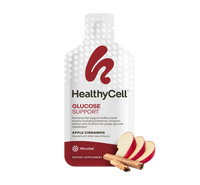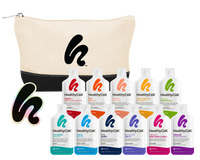In today's fast-paced world, prioritizing brain health and managing stress are more important than ever. Both adaptogens and nootropics have gained significant traction as natural supplements for achieving these goals. But with all the information swirling around, it's easy to get confused: which is better, adaptogens or nootropics?
This article dives deep into the world of these natural powerhouses, exploring their similarities and differences, potential benefits, and common examples. We'll also discuss some popular "dual-role" supplements that offer a combination of effects, helping you decide which might be the best fit for your needs.
Understanding Adaptogens
Adaptogens are natural substances derived from plants, roots, and mushrooms. Their name reflects their ability to "adapt" the body to stress, promoting a sense of balance and well-being. The history of adaptogens begins with traditional Chinese medicine and Ayurvedic practices which utilized them for various health concerns. Today, modern science is diving deeper into their mechanisms of action and revealing fascinating insights.
Adaptogens are believed to work by regulating the hypothalamic-pituitary-adrenal (HPA) axis, the body's central stress response system. By influencing the release of stress hormones like cortisol, adaptogens can help the body adapt to physical, emotional, and environmental stressors.
Common benefits associated with adaptogens:
- Reduced stress and anxiety: Adaptogens may help calm the nervous system and promote relaxation, potentially easing feelings of stress and anxiety.
- Enhanced physical and mental performance: Some adaptogens are believed to combat fatigue and improve stamina, leading to increased physical and mental performance.
- Balancing hormones and supporting overall wellness: By regulating the HPA axis, adaptogens may support healthy hormone balance and contribute to overall well-being.
Understanding Nootropics
Nootropics, also known as "smart drugs," are a category of substances that aim to enhance cognitive function. Their origins can be traced back to the 1960s, with ongoing research exploring their potential benefits and mechanisms of action.
Unlike adaptogens, nootropics primarily influence brain pathways and neurotransmitters directly involved in learning, memory, and focus. Some nootropics may increase blood flow to the brain, providing it with the necessary nutrients for optimal performance.
Common benefits associated with nootropics:
- Improved memory and learning: Certain nootropics may enhance memory consolidation and information recall, supporting learning and cognitive function.
- Enhancing focus and attention: Nootropics can potentially improve your ability to concentrate, filter distractions, and maintain focus on tasks.
- Supporting brain health and neuroprotection: Some nootropics exhibit neuroprotective properties, potentially aiding in brain health and possibly reducing the risk of cognitive decline.
Key Similarities Between Adaptogens and Nootropics
While adaptogens and nootropics have distinct focuses, they share some key similarities:
- Natural Powerhouses: Both adaptogens and many nootropics are derived from natural sources like plants, herbs, and mushrooms.
- Stress and Brain Health: Both categories aim to improve stress management and cognitive function, albeit through different mechanisms.
- Holistic Wellness Appeal: Both adaptogens and nootropics are increasingly embraced by the holistic health and wellness community, offering natural alternatives for brain health and stress relief.
Key Differences Between Adaptogens and Nootropics
The key differences between adaptogens and nootropics:
- Primary Function: Adaptogens prioritize overall stress resistance and promoting a sense of balance. Nootropics, on the other hand, specifically target and enhance cognitive functions like memory, focus, and learning.
- Mechanism of Action: Adaptogens influence the HPA axis, regulating stress hormones. Nootropics directly affect neurotransmitters and brain pathways related to cognition.
- Usage Context: Adaptogens are often used for general well-being, stress management, and promoting overall resilience. Nootropics are typically used for specific cognitive enhancement needs, like improving focus during study sessions or boosting alertness during a long workday.
Common Adaptogens
Here are some of the most popular adaptogens and their potential benefits:
- Ashwagandha: This well-known adaptogen is known for its stress-reduction properties. It may also help alleviate anxiety and promote relaxation. HealthyCell offers a high-quality Ashwagandha extract in its Calm Mood supplement, specifically formulated for stress management and emotional well-being.
- Rhodiola Rosea: This adaptogen is known for its ability to enhance physical and mental performance, potentially reducing fatigue and improving stamina.
- Holy Basil (Tulsi): This revered herb in Ayurvedic medicine is valued for its adaptogenic properties. It may help reduce anxiety and support overall well-being.
- Ginseng: This adaptogen is a popular choice for boosting energy levels and reducing feelings of fatigue. HealthyCell offers a high-quality Panax Ginseng extract in its Focus & Recall supplement, specifically formulated to enhance cognitive function and focus.
- Saffron: This spice exhibits adaptogenic properties, potentially improving mood and reducing stress.
Common Nootropics
Here are some of the most popular nootropics and their potential cognitive benefits:
- Bacopa Monnieri: This herb has been traditionally used in Ayurvedic medicine to enhance memory and cognitive function.
- Ginkgo Biloba: This extract is known for its potential to improve memory and circulation, promoting cognitive health.
- Lion's Mane Mushroom: This adaptogenic mushroom (yes, it can fall into both categories!) is gaining popularity for its potential to support neurogenesis (the growth of new brain cells) and overall brain health.
- L-Theanine: This amino acid found in green tea is known for its calming and focusing effects, promoting relaxation without drowsiness.
- Caffeine: This widely consumed stimulant increases alertness and attention. However, be mindful of potential side effects like anxiety or insomnia with excessive intake.
- Vitamins: Certain vitamins play crucial roles in brain function. Vitamin B6 supports neurotransmitter synthesis, Vitamin B12 aids in cognitive function and brain health, and Vitamin D contributes to overall brain health.
Dual-Role Supplements: Adaptogens and Nootropics
Interestingly, some natural substances exhibit properties of both adaptogens and nootropics. These "dual-role" supplements can offer a broader range of benefits:
Ashwagandha: As mentioned earlier, ashwagandha not only reduces stress but may also enhance cognitive function and memory.
Ginseng: Ginseng's ability to boost energy levels can translate to improved mental performance and focus.
Practical Considerations:
With this knowledge in hand, how do you choose the right supplement for your needs?
- Individual Health Goals: Are you primarily seeking stress relief and overall well-being (adaptogens), or do you need a cognitive boost for specific tasks (nootropics)?
- Consultation with Healthcare Professionals: Always consult with a healthcare professional before starting any new supplement, especially if you have underlying health conditions or take medications.
- Potential Side Effects: Most adaptogens and nootropics are generally well-tolerated, but some may cause mild side effects like headaches or digestive upset. Be mindful of potential interactions with medications.
- Quality and Sourcing: Choose high-quality supplements from reputable brands to ensure safety and efficacy.
Conclusion: Adaptogens vs. Nootropics - Finding Your Balance
The world of adaptogens and nootropics offers exciting possibilities for optimizing brain health and managing stress. While adaptogens prioritize overall balance and stress resilience, nootropics excel in enhancing specific cognitive functions. Understanding the key differences helps you choose the right supplement for your needs. Remember, a healthy diet and lifestyle are the cornerstones of well-being, and supplements can serve as valuable additions on your journey towards a sharper mind and a calmer you.
References
- Liao LY, He YF, Li L, et al. A preliminary review of studies on adaptogens: comparison of their bioactivity in TCM with that of ginseng-like herbs used worldwide. Chin Med. 2018;13:57. Published 2018 Nov 16. doi:10.1186/s13020-018-0214-9
- Malík M, Tlustoš P. Nootropics as Cognitive Enhancers: Types, Dosage and Side Effects of Smart Drugs. Nutrients. 2022;14(16):3367. Published 2022 Aug 17. doi:10.3390/nu14163367
- Mikulska P, Malinowska M, Ignacyk M, et al. Ashwagandha (Withania somnifera)-Current Research on the Health-Promoting Activities: A Narrative Review. Pharmaceutics. 2023;15(4):1057. Published 2023 Mar 24. doi:10.3390/pharmaceutics15041057
- Ivanova Stojcheva E, Quintela JC. The Effectiveness of Rhodiola rosea L. Preparations in Alleviating Various Aspects of Life-Stress Symptoms and Stress-Induced Conditions-Encouraging Clinical Evidence. Molecules. 2022;27(12):3902. Published 2022 Jun 17. doi:10.3390/molecules27123902
- Hasan MR, Alotaibi BS, Althafar ZM, Mujamammi AH, Jameela J. An Update on the Therapeutic Anticancer Potential of Ocimum sanctum L.: "Elixir of Life". Molecules. 2023;28(3):1193. Published 2023 Jan 25. doi:10.3390/molecules28031193
- Hyun SH, Kim SW, Seo HW, et al. Physiological and pharmacological features of the non-saponin components in Korean Red Ginseng. J Ginseng Res. 2020;44(4):527-537. doi:10.1016/j.jgr.2020.01.005
- El Midaoui A, Ghzaiel I, Vervandier-Fasseur D, et al. Saffron (Crocus sativus L.): A Source of Nutrients for Health and for the Treatment of Neuropsychiatric and Age-Related Diseases. Nutrients. 2022;14(3):597. Published 2022 Jan 29. doi:10.3390/nu14030597
- Valotto Neto LJ, Reverete de Araujo M, Moretti Junior RC, et al. Investigating the Neuroprotective and Cognitive-Enhancing Effects of Bacopa monnieri: A Systematic Review Focused on Inflammation, Oxidative Stress, Mitochondrial Dysfunction, and Apoptosis. Antioxidants (Basel). 2024;13(4):393. Published 2024 Mar 25. doi:10.3390/antiox13040393
- Biernacka P, Adamska I, Felisiak K. The Potential of Ginkgo biloba as a Source of Biologically Active Compounds-A Review of the Recent Literature and Patents. Molecules. 2023;28(10):3993. Published 2023 May 9. doi:10.3390/molecules28103993
- Li MY, Liu HY, Wu DT, et al. L-Theanine: A Unique Functional Amino Acid in Tea (Camellia sinensis L.) With Multiple Health Benefits and Food Applications. Front Nutr. 2022;9:853846. Published 2022 Apr 4. doi:10.3389/fnut.2022.853846




